
‘Wanderlust’ and The Sensation Behind the Sound
NPR’s Tiny Desk Concerts are quite possibly the best feature of contemporary pop culture; the chance to get up-close and personal with some of the world’s biggest artists is something that feels invaluable, so much so that I sometimes feel unworthy of listening for free. It’s a special skill to captivate audiences given such a small space to work in, and when someone does it right, they do it right.
As I sit down to write this piece, I’m listening to Durand Bernarr’s Tiny Desk Concert from last year – probably my 10th listen in the past week. Everything, from his braided beard adorned by a pink barrette to his background singers dressed as characters from The Proud Family, is striking in a way I’ve never seen. Bernarr introduces himself as, “your favorite cousin on your daddy’s side,” making the crowd giggle before jumping straight to wowing them with his vocal ability. He lights incense at the beginning of his set and sips tea from a thermos throughout, setting the scene for the intimate, soulful experience to come – one that can be replicated at home by listening to his expansive discography.
A week after his 34th birthday in 2022, Bernarr released Wanderlust, a funky, disco-esque 12-track RnB album. His sound is a completely new one – he fuses rock flairs with churchy vibratos and basslines to create new forms of the classic genres he is so clearly a student of. The artist from Cleveland is truly an anomaly; openly queer Black men are underrepresented in the RnB space, and ones that are as funny and lighthearted as he is are practically non-existent. He seamlessly blends comedy with soulful instrumentals and vocals to create a project with a truly special listening experience.
“Mango Butter” is undoubtedly the star of this album; it blew up on TikTok in 2022, where queer and gender non-conforming users used the witty chorus, “I’m a bad bitch and I’m that nigga,” to demonstrate their transformations and fluidity in expression. As Bernarr says, “It’s an African-American, queer proverb.” The track is a feel-good, self-affirming track that is easy to mumble along with without knowing any lyrics past those of the flagship line. If “Mango Butter” is a proverb, it ends with a short sermon; Bernarr stops to deliver a hilarious aside about how he is, once again, not only that bitch, but that nigga. A few of his other songs, like “Ingredients” and “STUCK” (from his 2020 album DUR&), also feature spoken skit-like segments, making Bernarr’s album as much of a story as it is a record.
Wanderlust is uniquely Black in the sense that it is instantly recognizable to any Black person who grew up in the church – the quick flips from head to chest voice, alongside the dance between the percussion and strings are similar to those of Gospel, even though the subject matter couldn’t be more different. This body of work could not be replicated by anyone, let alone an artist that hasn’t grown up in Black musical spaces. Bernarr’s lengthy tenure as a background singer for renowned artist Erykah Badu shines through in his commitment to the relaxing, powerful force of neo soul.
“Leveled” is a slower track about the grounding, changing force of love. “I never knew how high I was/Until you brought me down, leveled me out,” sings Bernarr. To me, the scene on Wanderlust’s cover – Bernarr writing onto a galaxy canvas while smoking, with the help of a TV-headed character off to the side – is an example of this feeling; however initially confusing love is, the more time you spend with it, you can’t help but feel bliss and calamity. It also shows his versatility, being able to merge electro-pop with jazzy sounds.
If I were you, I’d hop on the Durand Bernarr train sooner rather than later. I have a feeling he’ll blow up soon, and you’ll want to get to be one of those annoying fans who can say they’ve been here since he had fewer than 500,000 monthly Spotify listeners.
Post a comment